The topic of this article may not meet Wikipedia's general notability guideline .(December 2023) |

Eleonore Schwarz (born 1936 in Vienna) is an Austrian singer.
The topic of this article may not meet Wikipedia's general notability guideline .(December 2023) |

Eleonore Schwarz (born 1936 in Vienna) is an Austrian singer.
In the 1960s and 1970s, Schwarz was an opera singer at the Vienna Volksoper.
In 1962, she represented Austria at the Eurovision Song Contest [1] held in Luxembourg with operetta-like song named "Nur in der Wiener Luft" (Only in the Vienna air), the song received no points and ended up with three other participants in last place. The music was composed by Bruno Uher, and was written and directed about the beauty of the Austrian capital, including the Vienna State Opera, City Hall and St. Stephen's Cathedral but also the Viennese Waltz and Johann Strauss II. Schwarz released the song as a single and has had moderate success.

Eleanor is a feminine given name, originally from an Old French adaptation of the Old Provençal name Aliénor. It was the name of a number of women of royalty and nobility in western Europe during the High Middle Ages. The name was introduced to England by Eleanor of Aquitaine, who came to marry King Henry II. It was also borne by Eleanor of Provence, who became queen consort of England as the wife of King Henry III, and Eleanor of Castile, wife of Edward I.

The Vienna Central Cemetery is one of the largest cemeteries in the world by number of interred, and is the most well-known cemetery among Vienna's nearly 50 cemeteries. The cemetery's name is descriptive of its significance as Vienna's biggest cemetery, not of its geographic location, as it is not in the city center of the Austrian capital, but on the southern outskirts, in the outer city district of Simmering.

The Vienna State Opera is a historic opera house and opera company based in Vienna, Austria. The 1,709-seat Renaissance Revival venue was the first major building on the Vienna Ring Road. It was built from 1861 to 1869 following plans by August Sicard von Sicardsburg and Eduard van der Nüll, and designs by Josef Hlávka. The opera house was inaugurated as the "Vienna Court Opera" in the presence of Emperor Franz Joseph I and Empress Elisabeth of Austria. It became known by its current name after the establishment of the First Austrian Republic in 1921. The Vienna State Opera is the successor of the old Vienna Court Opera. The new site was chosen and the construction paid by Emperor Franz Joseph in 1861.

Maria Augusta von Trapp DHS, often styled as "Baroness", was the stepmother and matriarch of the Trapp Family Singers. She wrote The Story of the Trapp Family Singers, which was published in 1949 and was the inspiration for the 1956 West German film The Trapp Family, which in turn inspired the 1959 Broadway musical The Sound of Music and its 1965 film version.

Charlotte "Lotte" Pauline Sophie Lehmann was a German-American lyric soprano noted for her successful performances with international opera houses, on the recital stage and in teaching.She gave memorable appearances in the operas of Richard Strauss, Richard Wagner, Ludwig van Beethoven, Puccini, Mozart, and Massenet. The Marschallin in Der Rosenkavalier, Sieglinde in Die Walküre and the title-role in Fidelio are considered her greatest roles. During her long career, Lehmann also made almost five hundred recordings in both opera and art song.

Die Csárdásfürstin is an operetta in 3 acts by Hungarian composer Emmerich Kálmán, with libretto by Leo Stein and Bela Jenbach. It premiered in Vienna at the Johann Strauss Theater on 17 November 1915. Numerous film versions and recordings have been made. The operetta is widely beloved across Europe, particularly in Hungary, Austria, Germany, and the former Soviet Union, where it was adapted into a popular film. It is arguably Kálmán's most successful work.
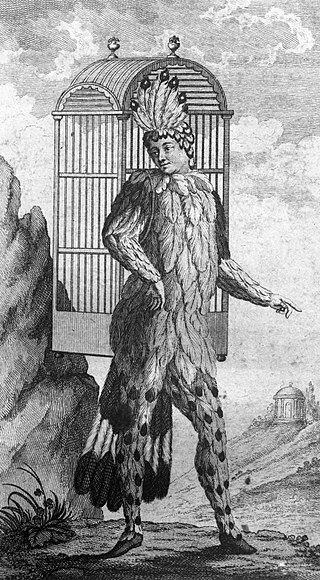
Emanuel Schikaneder was a German impresario, dramatist, actor, singer, and composer. He wrote the libretto of Wolfgang Amadeus Mozart's opera The Magic Flute and was the builder of the Theater an der Wien. Peter Branscombe called him "one of the most talented theatre men of his era". Aside from Mozart, he worked with Salieri, Haydn and Beethoven.

The Trapp Family was a singing group formed from the family of former Austrian naval commander Georg von Trapp. The family achieved fame in their original singing career in their native Austria during the interwar period. They also performed in the United States before emigrating there permanently to escape the deteriorating situation in Austria leading up to World War II. In the United States, they became well known as the "Trapp Family Singers" until they ceased to perform as a unit in 1957. The family's story later served as the basis for a memoir, two German films, and the Rodgers and Hammerstein Broadway musical The Sound of Music. The last surviving of the original seven, Maria Franziska, died in 2014 at the age of 99. The youngest and last surviving member of the Trapp Family Singers is Johannes von Trapp.
Gundula Janowitz is an Austrian lyric soprano singer of operas, oratorios, lieder, and concerts. She is one of the most renowned opera singers of the 20th century and was pre-eminent in the 1960s and 1970s.

Christina Stürmer is an Austrian singer and songwriter. Born and raised in Linz, she rose to fame as the runner-up of the inaugural season of the ORF eins television talent series Starmania. Following her participation, she signed with Universal Music and released her debut single "Ich lebe" which spent nine weeks atop the Austrian Singles Chart. It was followed by the release of her first two albums, Freier Fall (2003) and Soll das wirklich alles sein (2004), both of which debuted atop the Austrian Albums Chart and produced eight top ten hits, including the number-one singles "Mama " and "Vorbei".
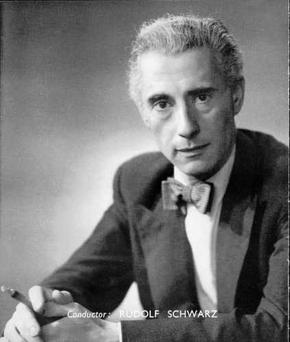
Rudolf Schwarz was an Austrian-born conductor of Jewish ancestry. He became a British citizen and spent the latter half of his life in England.
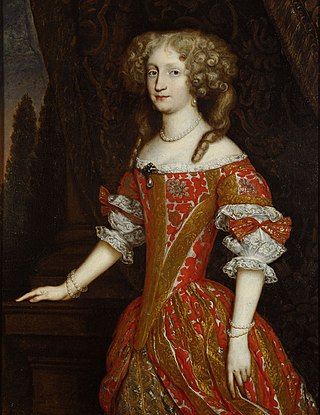
Eleonore Magdalene Therese of Neuburg was Holy Roman Empress, German Queen, Archduchess of Austria, Queen of Hungary and Bohemia as the third and final wife of Leopold I, Holy Roman Emperor. Before her marriage and during her widowhood, she led an ascetic and monastic life, translating the Bible from Latin to German and defended the Order of the Discalced Carmelites. Reputed to be one of the most educated and virtuous women of her time, Eleonore took part in the political affairs during the reign of her husband and sons, especially regarding court revenue and foreign relationships. She served as regent for a few months in 1711, period in which she signed the Treaty of Szatmár, which recognized the rights of her descendants to the Hungarian throne.
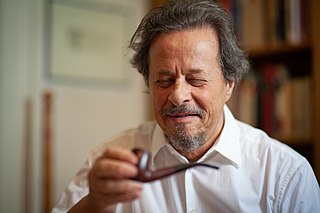
Iván Erőd was a Hungarian-Austrian composer and pianist. Educated in Budapest, he emigrated to Austria in 1956, where he studied at the Vienna Music Academy. He was successful as a pianist and composer of operas, chamber music and much more, with elements from serialism, Hungarian folk music and jazz. He first was a professor of music theory and composition at the University of Music and Performing Arts Graz (1967–1989), then a professor of composition at the Vienna Music Academy from 1989.
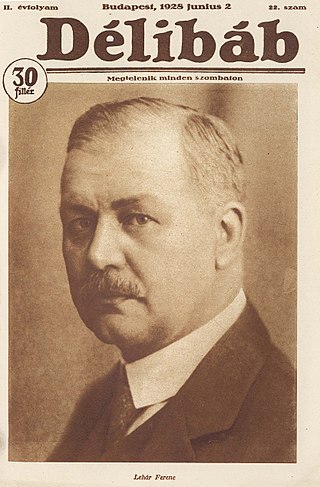
Paganini is an operetta in three acts by Franz Lehár. The German libretto was by Paul Knepler and Bela Jenbach.

Bertha Schwarz (1855-1947), often known by her stage name Bianca Bianchi, was a German coloratura soprano opera singer of the late 19th century. Her greatest successes were at Vienna.
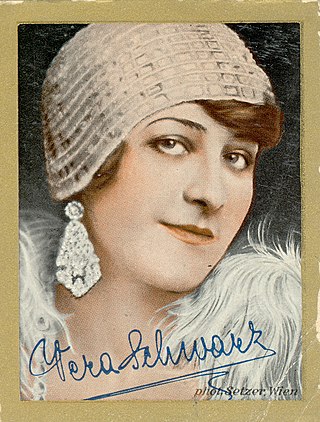
Vera Schwarz was an Austrian soprano, known primarily for her operetta partnership with Richard Tauber.

Amalie Marie Joachim was an Austrian-German contralto, working in opera and concert and as voice teacher. She was the wife of the violinist Joseph Joachim, and a friend of Clara Schumann and Johannes Brahms, with whom she made international tours.
Peter Minich was an Austrian stage actor who became a tenor performing in operas, operettas and musical films. He was for decades the lead tenor of the Volksoper in Vienna, focused on Viennese operetta.

Feuerhalle Simmering is a crematorium with attached urn burial ground in the Simmering district of Vienna, Austria. It lies at the end of an alley, directly opposite Vienna Central Cemetery's main gate.
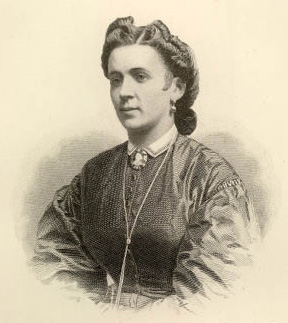
Eleonore de Ahna, occasionally also Leonore de Ahna, was a German operatic soprano/mezzo-soprano.